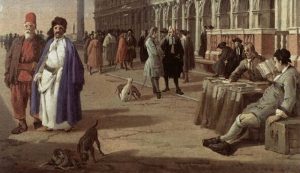Insightful quote from Adam Bates:
Q: What is it about the libertarian movement that attracts as you say, “rape apologists, Islamophobes, and nativists?”
A: I think there are two largely distinct strains of belief that lead people to anarchism/libertarianism. One is a fundamental commitment to the liberation of others, and the other is a fundamental and exclusive commitment to the liberation of oneself or one’s tribe.
Both of those sets of people are going to be anti-government, both of them are going to be largely non-interventionist, both of them are going to feel like they support liberty (albeit one definition is universal and the other is tribal), and I think libertarianism has obvious appeal beyond the alternatives.
But with the rise of the social justice movement and increasing global connectivity, we’re seeing that distinction grow starker by the minute. The “tribaltarians” aren’t going to support immigration, they’re not going to support race or culture mixing, they’re not going to support trade, they’re not going to accept any arguments about collective crimes against groups of people that aren’t them, they’re going to recoil at any and every effort to erase the philosophical and moral buffers between “them” and “us.”
So I get it. I get how they got here. But if there ever was a reason for these two groups of people to caucus together, it has now evaporated entirely.
I’m also reminded of Rand’s analysis of tribalism [link goes to an MS Word document]. (The fact that Rand herself was frequently guilty of tribalism doesn’t make her analysis any less useful.)

 Of course, the requirement to “spread not thine opinions abroad” (at least in matters of religion) suggests that this freedom had its limits – though I’m not sure whether Thomas intends this restriction to apply to all three of the non-Christian religions he references, or only to devil worship. Still, Thomas’s description of Venice is reminiscent of
Of course, the requirement to “spread not thine opinions abroad” (at least in matters of religion) suggests that this freedom had its limits – though I’m not sure whether Thomas intends this restriction to apply to all three of the non-Christian religions he references, or only to devil worship. Still, Thomas’s description of Venice is reminiscent of 
